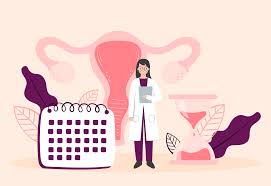Certainly, here's a comprehensive overview of infertility, covering its types, causes, symptoms, diagnosis, and treatment options:
Types of Infertility:
- Primary infertility: When a couple has never been able to conceive despite regular, unprotected intercourse for at least a year.
- Secondary infertility: Occurs when a couple has previously conceived and given birth, but is unable to conceive again after a year of trying.
Causes of Infertility:
- Ovulation disorders: Irregular or absent ovulation can be caused by hormonal imbalances, polycystic ovary syndrome (PCOS), thyroid disorders, or stress.
- Fallopian tube damage or blockage: Conditions such as pelvic inflammatory disease (PID), endometriosis, or previous pelvic surgery can cause scarring or blockage of the fallopian tubes, hindering the fertilization process.
- Uterine or cervical abnormalities: Structural issues in the uterus, such as fibroids, polyps, or congenital anomalies, as well as cervical mucus abnormalities, can affect fertility.
- Male factors: Low sperm count, poor sperm motility, abnormal sperm morphology, or blockages in the male reproductive tract can contribute to infertility.
- Age: Advanced maternal or paternal age can reduce fertility due to declining egg and sperm quality.
- Lifestyle factors: Factors such as obesity, smoking, excessive alcohol consumption, drug use, and exposure to environmental toxins can negatively impact fertility.
- Medical conditions: Certain medical conditions, such as diabetes, autoimmune disorders, cancer, or sexually transmitted infections, can affect fertility.
Symptoms of Infertility:
- Inability to conceive: The primary symptom of infertility is the inability to conceive after a year of regular, unprotected intercourse (or six months for women over 35).
- Irregular menstrual cycles: Irregular or absent menstrual periods may indicate ovulation disorders or hormonal imbalances.
- Painful periods or intercourse: Conditions such as endometriosis or pelvic inflammatory disease can cause painful periods or discomfort during intercourse.
Diagnosis of Infertility:
- Medical history and physical examination: Healthcare providers will inquire about the couple's medical history, lifestyle factors, and sexual habits, and conduct a physical examination to identify any potential causes of infertility.
- Ovulation testing: Ovulation can be assessed through methods such as tracking menstrual cycles, basal body temperature charting, ovulation predictor kits, or blood tests to measure hormone levels.
- Semen analysis: A semen analysis is performed to evaluate sperm count, motility, morphology, and other parameters of sperm quality.
- Imaging tests: Ultrasound, hysterosalpingography (HSG), or hysteroscopy may be used to assess the uterus, fallopian tubes, and ovaries for abnormalities.
- Hormone testing: Blood tests can measure hormone levels such as estrogen, progesterone, luteinizing hormone (LH), follicle-stimulating hormone (FSH), and thyroid hormones to assess hormonal balance and ovarian function.
- Diagnostic procedures: Procedures such as laparoscopy or hysteroscopy may be performed to directly visualize and diagnose abnormalities in the reproductive organs.
Treatment of Infertility:
- Lifestyle modifications: Adopting a healthy lifestyle, including maintaining a balanced diet, regular exercise, weight management, and avoiding harmful substances, can improve fertility.
- Medications: Fertility medications such as clomiphene citrate, letrozole, or gonadotropins may be prescribed to induce ovulation or improve egg quality.
- Assisted reproductive technologies (ART):
- Intrauterine insemination (IUI): Sperm is directly inserted into the uterus during ovulation to improve the chances of fertilization.
- In vitro fertilization (IVF): Eggs are retrieved from the ovaries, fertilized with sperm in a laboratory, and then implanted into the uterus.
- Intracytoplasmic sperm injection (ICSI): A single sperm is injected directly into an egg in the laboratory to facilitate fertilization.
- Donor eggs or sperm: In cases of severe male or female infertility, donor eggs or sperm may be used in fertility treatments.
- Surgery: Surgical procedures may be performed to correct structural abnormalities in the reproductive organs, remove blockages, or treat conditions such as endometriosis or fibroids.
- Alternative therapies: Some couples may explore alternative or complementary therapies such as acupuncture, herbal supplements, or stress reduction techniques to improve fertility, although evidence supporting their effectiveness is limited.
The appropriate treatment for infertility depends on the underlying cause, the duration of infertility, the age of the individuals involved, and personal preferences. It's important for couples experiencing infertility to seek evaluation and guidance from a fertility specialist or reproductive endocrinologist to explore their options and develop a personalized treatment plan.




.png)

Comments